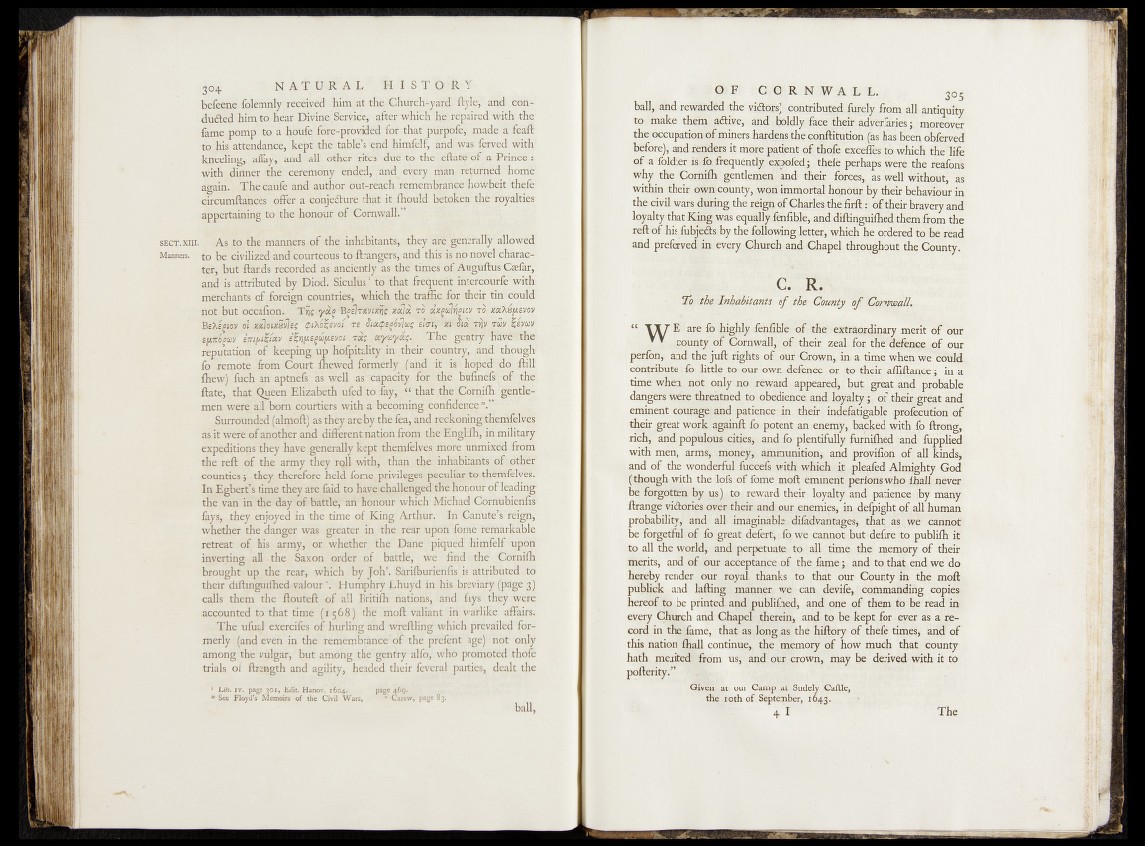
befeene folemqlj'rece&ed him at thqyChurcfeya’rd; ftyle; ■ and Conduced
SECT. XIII.
Maimers.
hirn to* near Divine Service, after which hMrdpirired with the’
fame pomp to a hbufe'fete-provided''for that' pufpofe,; made a feaft
to .his attendance* kept .the table ^end himfelf, add was' fetved? with;
kneeling, aflay, and 'all other rite's* due to the • e'ftatdri'fra Prince :
with diifner the cereinony ended,; Jand eyery man Returned-home1 *
again. -The^qaufe add author out-reach remembrance'howbeit thdfe:
circumfta&ces offer a conjedture that it fhbuld betoken thferijpyalties
appertaining.‘to the honour of Cornwall«”
As to the manners of the inhabitants, they afe ’generally* allowed
to be civilized andeoufteotis tci-ftrangers,and thirds W noyd;:cfrarac-
ter, but Hands recorded as anciently as the times of Adgufhis'?Cfefdf,;
and'is attributed by Diod. Siculus' to that frequetit 'i&forcdurfe with
merchants of foreign countries, which th§. tragic, for their tin'* cbuldi
not but occafton. *xxla m
BsKb^lov ol xuloixSvlec piXo&voi re <5ia<pSf&v7a>c u $M ;Tfjv rav Zsvuv
sfiKopm exipt&txv £^nfH£^£V0t tac u.yuya.Q. genri^'lfav#the
reputation of keeping up hofpitality in their country, and though*
fe Remote from Court fheweel formerly (a'nd .it' S i hoped 'ddfeftiir
fhew) fuch an aptnefs'as well as'capacity fd^'fHe bnfinefs''ri'f; the
Hate, that Queen Elizabeth ufed to fey.,,;“ that ,t|ie,CornHh ^ncley
men were all bom courtiers with a becoming 'confflqfef
Surrounded (alipoft) as they are by the fea, and redkohing themfelves
as it were o f another and different nation from the Engtilh, mmifeary
expeditions they have generally kept themfelves-more unmixed from”
the reft of the army they t^JI with, than the inhabitants qPjdt^r
counties; they therefore held feme privileges .peculiar tO'themfelves.
In Egbert’s time they are feid to h^ye chaUengfedalS.flon6iir of feadihg'
the van in the day of battle, an nonour which' Michael Corntlbiemis'
feys, ..they enjoyed in the time of King Arthur. In Canute’s reign,
whether the danger was greater in the rear updft feme fettiarkahfe
retreat of his army, or whether the Dane piqued hi mfelf upon
inverting all the Saxon order of battle, we find the Cornifh
brought up the rear, which by Joh5. Sarifburienfis is attributed to
their diftinguilhed valour ”. Humphry Lhuyd in his breviary (page 3I
calls them the ftouteft of all Britifh nations, and fays they were
accounted to that time (1568) the moft valiant in warlike affairs.
The ufual exercifes o f hurling and wreftling which prevailed formerly
(and even in the remembrance o f the prefent age)'not only
among the vulgar, but among the gentry alfo, who promoted thofe
trials of ftresgth and agility, headed their feveral parties, dealt the
1 Lib. iv. page 301, Edit. Hanov. 1604*',, : page 469«
m See Floyd's Memoirs of the Civil Wars, n Carew, page 03.
ball,
ball;iaihd rewarded ithe vigors), contribute! .finely from all antiquity
to;make them active, and^|©ldly.face their adverferjes; moreover
the occupation;of miners hardens the conftitution (as has been obferveef
before), and renders it more patfent of feofe excefles to* which the life
of a folcficr isTo/requently expofed; thefe perhaps were the reafons
why the Cornifh gentlemen/ and their forces, as (well without, as
within their own county, (won .immortal honour by their behaviour in
the civil wars dthmg the reign of Ch^rles/the firft: o£{their bravery and
loyalty that King was equally fenfible, and diftinguifhecl them from the
reft of his fuhje^ts by the following letter, which he ordered to be read
and preferved. in.evqry Church and Chapel throughout the Cpunty.
C. R.
To the Inhabitants o f the County 'óf Cornwall.
“ T I T E are fo Jiighly fehfible of the extraordinary merit of our
’ ’ ^county of Cornwall, óf' their zeal ,for the defence of our
perfbn, and the juft rights of_ our Crown, in a time, wherr we could
contribute * fo litt^ our own defence or ;tp their affift^nce; in a
time when not only no reward appeared, but great and probable
dangers were threatned to obedience, and loyalty;, of thejygreat and
eminent couragef and patience ;_in, their , indefatigable profectition of
their great work againft fo potent an enemy, backed with fo ftrong,
rich,' and populous cities, and fo plentifully furnifhed and fupplied
with men, arms, money, ammunition, and provifion of all kinds,
and of the wonderful fuccefs with which it pleafbd Almighty God
(though with the lofs óf feme móft eminent perfons who fhall never
be forgotten by ns),, to reward feeir loyalty and patience -by many
ftrange victories over.their human
probability, and all imaginable, ififedvantages, that-as we cannot
be forgetful, o f fb great defert, fo we cannot jbut defrre to publifh it
to all the world, and perpetuate, tó all time the memory of their
merits, and o f. our acceptance,of the feme;, and to that end we do
hereby render our royal thanks to that our County In the moft
publiek and lafting manner we can devife, commanding copies
hereof to .be printed and publifhed, and one of them to be read in
every Church and Chapel therein, and to be kept for ever as a record
in the feme, that as.long.as; the hiltory of thefe times, and of
this nation fhall continue, the memory of how much that county
hath merited from us; and. our crown, may be derived with it to
pqfterity.>, ;ff|§fei
Given at our Camp at Sudely Caftle,
the 10th of September, 1643.
4 I ' " The
f